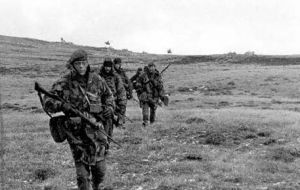MercoPress. South Atlantic News Agency
Suffering and Suicides of Falklands Veterans
 Veterans suffer post traumatic stress disorder, said General Thompson
Veterans suffer post traumatic stress disorder, said General Thompson As the United Kingdom commemorates the 25th anniversary of the Falklands War this week, it is claimed that more members of the armed forces have committed suicide as a result of their experiences than died in the fighting itself.
Quoting the veterans' organisation, --the South Atlantic Medal Association (SAMA)--a magazine claims that at least 300 of the Falklands' veterans and perhaps many more have committed suicide in Britain, compared with 255 men of the Task Force killed in the war. It is estimated that 460 Argentine veterans have also committed suicide. The article, entitled "A Land Unfit for Heroes" â€" in the Sunday Times newspaper -- lists a series of personal tragedies in which servicemen have killed themselves by taking pills, stabbing themselves, or throwing themselves off buildings or from aircraft. Others have turned to drug-taking and crime. Haunted by horrific battlefield experiencesIt says many of the men suffer post traumatic stress disorder (PTSD) without getting sufficient treatment. Previously the servicemen have been treated in dedicated military hospitals, but nearly all have been closed down and merged with the National Health Service. The article quotes several personal accounts of horrific deaths on the battlefield, especially in the close combat at Goose Green, where British soldiers say they are haunted by memories and flashbacks. One paratrooper who won the Military Medal for bravery is quoted as saying: "I see the fear in the faces of the Argentines I killed. They were trying to kill us but we were elite forces in a battle with conscripts of 18 and 19. They did not have a chance". Some who have returned to the Falklands on visits, say they fund it helpful to walk the battlefields and realise the enormity of what happened. One soldier said he had been helped by making contact on the internet with an Argentine conscript named Alejandro Videla for whom he raised money to invite him to his home in England. When they discussed Goose Green, they realised they had been fighting opposite each other and saw some of the same dreadful deaths. Plea for treatment and funds The article quotes Major General Julian Thompson, Britain's most successful land commander in the War, as accusing Government ministers of ignorance in closing military hospitals. "This ignorance", General Thompson says, "extends to veterans suffering from post traumatic stress disorder. They fought for us and are ignored or sent to National Health Service hospitals among people who do not comprehend what they experienced or what they suffer". The article says that the shocking truth is that PTSD is not just a potential death sentence for hundreds of ex-servicemen but also a blight on their families. The article says many men leaving the forces feel alienated, bewildered, abandoned and suicidal. Their only hope is the sole UK charity looking after psychologically injured servicemen and women and their families, called Combat Stress. The charity says it desperately needs more funding. It has been arguing for years with the Government, which wants it to do more. But, its chief executive, Commodore Toby Elliott, says: "Who will pay?" Brave Falkland Islanders One of the Welsh Guardsmen, Simon Weston, severely burned when Argentine aircraft bombed the assault ship "Sir Galahad" has been featured in several articles and radio and television programmes. He was asked, in view of what happened to him and his comrades who died: "Was it all worth it?", he replied that he thought it was, otherwise, after al his suffering and the loss of so many friends, he would go mad. Other television programmes this week will focus on the Vulcan bomber raid on Stanley airport and on the part played by brave Falkland Islanders in helping the task force by transporting weapons to the front line on their farm tractors and bringing back wounded. One of their leaders, Mrs Trudi McPhee, who was commended by the Task Force Commander-in-Chief for her bravery, is pictured on a double page spread in one magazine, with her dog, and quoted as saying: I just felt furious that these buggers had come and invaded my carrot patch!" Harold Briley, London.




Top Comments
Disclaimer & comment rulesCommenting for this story is now closed.
If you have a Facebook account, become a fan and comment on our Facebook Page!